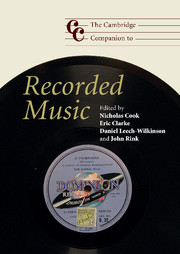Book contents
- Frontmatter
- Introduction
- Learning to live with recording
- A short take in praise of long takes
- 1 Performing for (and against) the microphone
- Producing a credible vocal
- ‘It could have happened’: The evolution of music construction
- 2 Recording practices and the role of the producer
- Still small voices
- Broadening horizons: ‘Performance’ in the studio
- 3 Getting sounds: The art of sound engineering
- Limitations and creativity in recording and performance
- Records and recordings in post-punk England, 1978–80
- 4 The politics of the recording studio: A case study from South Africa
- From Lanza to Lassus
- 5 From wind-up to iPod: Techno-cultures of listening
- A matter of circumstance: On experiencing recordings
- 6 Selling sounds: Recordings and the record business
- Revisiting concert life in the mid-century: The survival of acetate discs
- 7 The development of recording technologies
- Raiders of the lost archive
- The original cast recording of West Side Story
- 8 The recorded document: Interpretation and discography
- One man's approach to remastering
- Technology, the studio, music
- Reminder: A recording is not a performance
- 9 Methods for analysing recordings
- 10 Recordings and histories of performance style
- Recreating history: A clarinettist's retrospective
- 11 Going critical: Writing about recordings
- Something in the air
- Afterword: Recording: From reproduction to representation to remediation
- Notes
- Bibliography
- Discography
- Index
1 - Performing for (and against) the microphone
Published online by Cambridge University Press: 28 September 2011
- Frontmatter
- Introduction
- Learning to live with recording
- A short take in praise of long takes
- 1 Performing for (and against) the microphone
- Producing a credible vocal
- ‘It could have happened’: The evolution of music construction
- 2 Recording practices and the role of the producer
- Still small voices
- Broadening horizons: ‘Performance’ in the studio
- 3 Getting sounds: The art of sound engineering
- Limitations and creativity in recording and performance
- Records and recordings in post-punk England, 1978–80
- 4 The politics of the recording studio: A case study from South Africa
- From Lanza to Lassus
- 5 From wind-up to iPod: Techno-cultures of listening
- A matter of circumstance: On experiencing recordings
- 6 Selling sounds: Recordings and the record business
- Revisiting concert life in the mid-century: The survival of acetate discs
- 7 The development of recording technologies
- Raiders of the lost archive
- The original cast recording of West Side Story
- 8 The recorded document: Interpretation and discography
- One man's approach to remastering
- Technology, the studio, music
- Reminder: A recording is not a performance
- 9 Methods for analysing recordings
- 10 Recordings and histories of performance style
- Recreating history: A clarinettist's retrospective
- 11 Going critical: Writing about recordings
- Something in the air
- Afterword: Recording: From reproduction to representation to remediation
- Notes
- Bibliography
- Discography
- Index
Summary
The performer's view of the microphone is a unique one. Invisible to the listener and a tool of the trade for the producer or engineer, the microphone is the representative of potentially countless future audiences. As such, the microphone confronts the performer as an inhuman critic.
The following addresses the recording situation from the performer's perspective. Throughout I will make reference to my own experience and draw upon that of others who have read and commented on earlier drafts, but I will also set those comments within a broader theoretical framework.
Though predominantly trained and employed in the classical field, I have corresponding experience on the lighter side of music (pop and musical theatre backing vocals, film sessions, etc.). It is here that I have met and worked with performers with a different, pop background who have become more general recording artists or ‘session singers’. I have no direct experience, then, of working as a pop musician, but a comparison (rather than a clear-cut opposition) between classical and pop musicians provides a useful methodological contrast and reveals much about different conceptions and attitudes towards recording and technology. It also underlines some of the organisational assumptions, attitudes to technology and working practices of both. Much of what I say will be true for instrumental musicians as well as for singers, but I will limit myself to specific observations about ensemble singers.
- Type
- Chapter
- Information
- The Cambridge Companion to Recorded Music , pp. 16 - 29Publisher: Cambridge University PressPrint publication year: 2009
- 2
- Cited by



